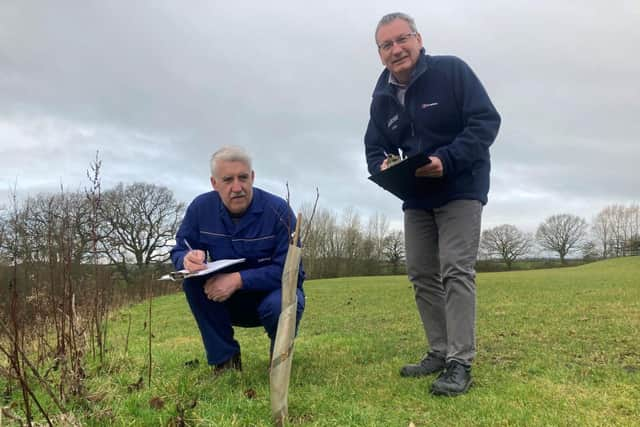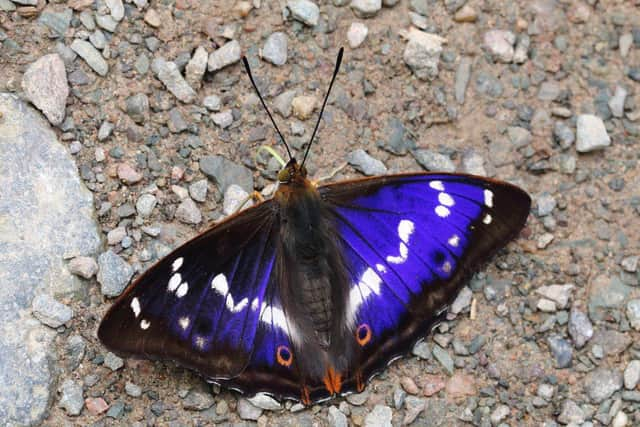Derbyshire science company latest to join sapling planting for iconic Purple Emperor butterfly
and live on Freeview channel 276
A science company based in lush Derbyshire countryside where employees have spent years conducting weekly butterfly counts is the latest place to prepare a welcome for one of the UK’s most iconic species as it moves north through the country.
Lubrizol, whose UK Technical Centre is based in a former stately home and grounds at Hazelwood, near Duffield, is one of several organisations to be preparing to welcome the beautiful Purple Emperor butterfly on its northwards journey through the UK.
Advertisement
Hide AdAdvertisement
Hide AdThe company has been a corporate partner of the Derbyshire Wildlife Trust for more than 20 years and since 2019 dedicated employees have been conducting weekly ‘transects’ – butterfly monitoring walks – during the warmer months.


Now Lubrizol has planted some Goat Willow trees, known as Sallow ‘whips’. These are the ideal habitat for the beautiful Purple Emperor, which due to climate change is moving north through the country. Other areas where the Sallow whips have been planted include Allestree Park.
The tree planting has been born from an initiative between East Midlands Butterfly Conservation and South Derbyshire District Council, which, with the support of the National Forest Company, have funded 550 Goat Willow trees in this area to allow the Purple Emperor to thrive here.
Lubrizol’s trees have been planted at the top of a butterfly bank created by the company as part of its wide-ranging work to make sure its site offers a good habitat for wildlife.
Advertisement
Hide AdAdvertisement
Hide AdThe company’s lovely grounds are home to a range of species including butterflies, hares, kestrels, deer, bats and owls who live happily alongside the chemists, data analysts, engineers and accountants who work there.


Dave Adams, European security advisor for Lubrizol in Hazelwood, is one of a group of employees who walk around the site each week between April to October to count butterfly numbers. Another regular on the butterfly transect walks is Quality Systems Manager Claire Hollingshurst.
The data is then used by Derbyshire’s butterfly recorder, Ken Orpe, who has visited Lubrizol on several occasions and uses the information to contribute to a national picture. Butterflies are key indicators of the environment’s health and have vastly decreased in numbers over the last few decades.
Dave said: “Counting butterflies helps generate information and how we can improve the environment for wildlife. I’m happy to try and help any initiative like this.”
Advertisement
Hide AdAdvertisement
Hide AdThe Purple Emperor – should it choose to settle on the Lubrizol site – would not be the first interesting butterfly to be spotted there. Participants in Lubrizol’s butterfly transect walk were also excited last year to spot a rare White Letter Hairstreak, a species that declined by more than 90 per cent since the 1970s since the Elm trees on which it feeds were decimated by disease.
Dave said: “I saw a small brown butterfly and we did have a chance to have a good look at it. I’d been doing this for four years and I’d never seen one before.”
Ken, who has helped Lubrizol conduct its butterfly transects and plant a butterfly bank, said 17 species had been spotted in the science company’s grounds since the transects had been taking place.
He said: “It’s brilliant that Lubrizol is prepared to do something for wildlife. There have been massive changes for butterflies in the last 20 years – it’s like a switch has been turned on. Species that used to be seen in Derby can’t keep up with the warmer temperatures and have moved northwards.”
Dave said he enjoyed working for a company which was so supportive in providing good habitats for wildlife.
He said: “Lubrizol is very supportive. It’s a great site to work in.”